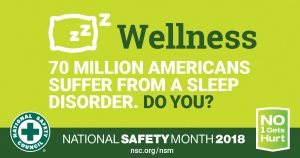
Taking care of daily issues, household needs and pressing work deadlines seem to always take priority over taking care of ourselves. Making a conscious effort to focus on our own wellness is critical to our overall wellbeing and health. As part of National Safety Month, the National Security Council has provided some tips on how to improve wellness at every stage of life.
Focus on Your Wellness Each Day
- Take the stairs instead of the elevator or go for a walk at lunch to add physical activity into your daily schedule
- Take advantage of workplace wellness programs and choose healthy snacks each day
- Find nearby options for exercise classes through your local parks department
- Take breaks throughout your day to refresh your body and mind - if you sit for long periods, stand up and stretch for a few minutes at a time
- Get regular medical checkups, such as an annual physical and age-appropriate tests - ask a professional about the right tests, exercise and nutrition choice for your physical fitness and age
- Talk to your doctor about alternatives to opioid pain medications - learn more at nsc.org/takeaction
Watch Out for Fatigue
Fatigue is more than just being tired. If you’re missing out on the recommended seven to nine hours of sleep each day, you could become sleep deprived and be at higher risk for the negative effects of fatigue.

- Chronic sleep deprivation causes depression, obesity, cardiovascular disease and other illnesses
- Fatigued driving is impaired driving – losing even two hours of sleep is similar to the effect of having three beers
- Night shifts and rotating shifts put you at a higher risk of fatigue – if possible, work with your employer to align your sleep and work schedules to get restful sleep
- To help combat fatigue, make your bedroom more conducive to sleep; a quiet, dark room that is not too hot and not too cold will help you relax and get to sleep sooner
- Avoid chemicals that affect sleep; caffeine, nicotine and alcohol can all contribute to sleep problems
- Help your loved ones get the proper amount of sleep – children and teens typically require even more sleep than adults
Additional Resources
Risks of Fatigue at the Workplace
Sample Employee Wellness Program
Source: National Safety Council
